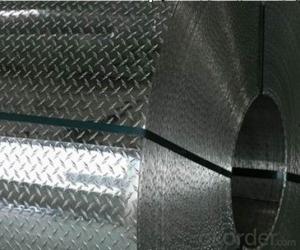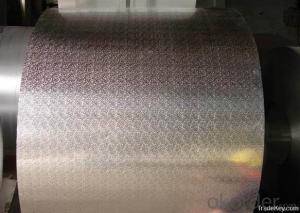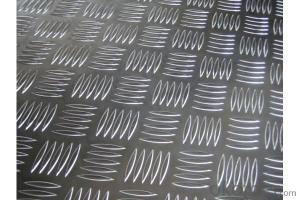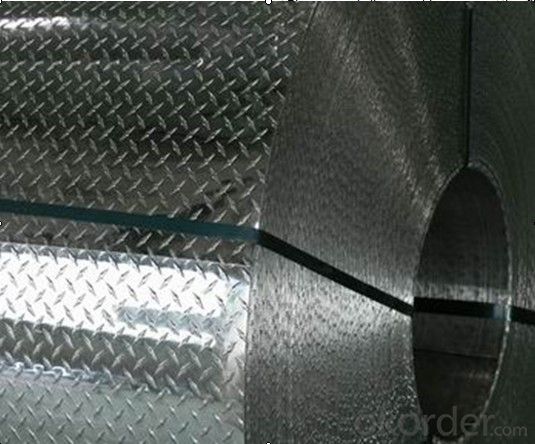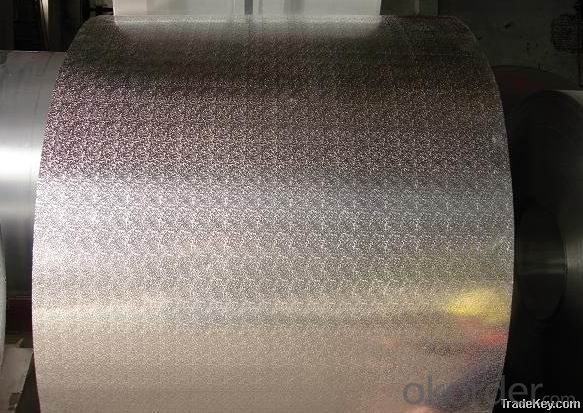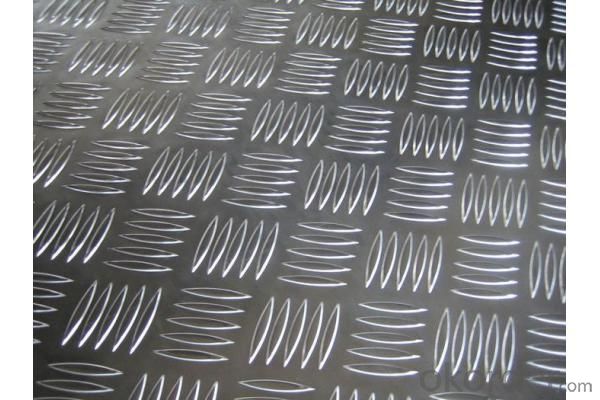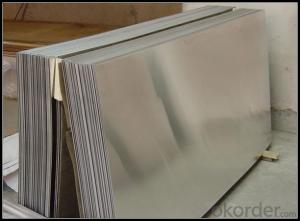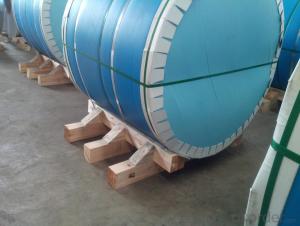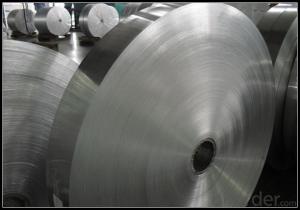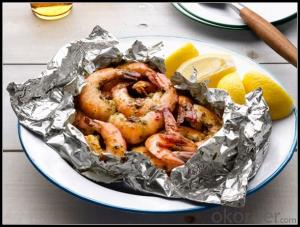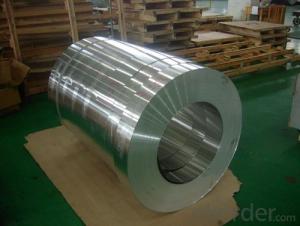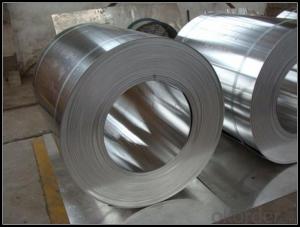Aluminum Strip Coils 1060 1100 3003 5052 Embossed Aluminum Coil
- Loading Port:
- Tianjin
- Payment Terms:
- TT OR LC
- Min Order Qty:
- 100 m.t
- Supply Capability:
- 10000 m.t/month
OKorder Service Pledge
OKorder Financial Service
You Might Also Like
Specification
Specification:
Product | stucco checkered aluminum coil |
standard | ISO, GB, ASTM, AISI,etc |
certification | ISO |
thickness | 0.2-100mm |
width | 0.5-2m |
grade | 1000---7000 series |
colour | silver,golden,red, blue. etc |
surface treatment | polished ,anodized,mill finishing |
Application | machine,construction,decoration,fuiniture,industry,etc |
MOQ | 1 ton |
Delivery time | normally within 10-20 days after getting your deposits. |
Payment terms | L/C, T/T |
Supply ability | 5000 tons/month |
Packaging | 1.Export standard packaging, or according to the customer demands 2.with wooden pallets or film covered , in the containers. 3.The inner size of container is below: |
Features for Aluminum coil:
1) High flexibility
2) Excellent weather-proof durability
3) Anti-ultraviolet
4) High erosion resistance
5) Good mechanical processing performance
6) Stable color and gloss
Features for Aluminum coil:
1) High flexibility
2) Excellent weather-proof durability
3) Anti-ultraviolet
4) High erosion resistance
5) Good mechanical processing performance
6) Stable color and gloss
FAQ
Q: Do you have the CE, TUV, UL Certification?
A: We’ve already passed all the tests, and any certificate is available.
Q: Have you ever sold your products to companies in my country?
A: Of course, we have customers in all general PV markets, but I think we should expand our market share along with the market growth.
Q: How do you pack your products?
A: We have rich experience on how to pack to make sure the safety on shipment when it arrives at the destination.
Q: Can you do OEM for us?
A: Yes, we can.
Q: Can we visit your factory?
A: Surely, I will arrange the trip basing on your business schedule.
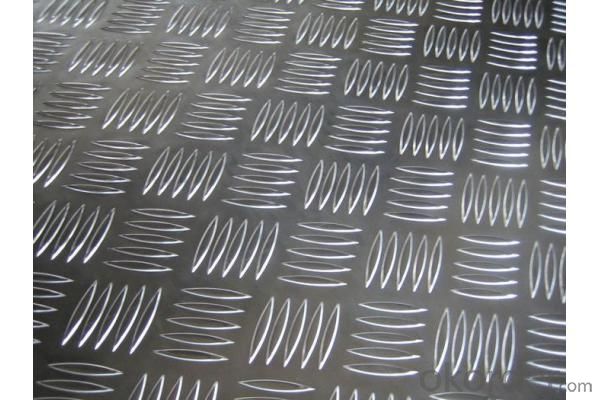
- Q: Cost of aluminium coil coating fluorocarbon paint?
- Hello, fluorocarbon paint according to the use of distinction: external wall fluorocarbon paint, aluminum, fluorocarbon paint, metal fluorocarbon paint, steel, fluorocarbon paint. According to industry standards to distinguish: GB products, non GB products.
- Q: Can aluminum coils be utilized as a material for crafting jewelry?
- <p>Yes, aluminum coils can be used for making jewelry. Aluminum is a lightweight, durable, and affordable metal that is often used in costume jewelry and for decorative purposes. It can be easily shaped, bent, and manipulated into various forms, making it suitable for creating intricate designs. However, it's important to note that aluminum is a softer metal and may not be as durable as other metals like stainless steel or silver, so it may not be ideal for pieces that will be worn daily or subjected to significant wear and tear.</p>
- Q: A nitrate is added with sodium hydroxide, then a piece of aluminum foil. After warming the mixture, ammonia gas is released.A source tells me that aluminum reduces nitrate ion into the ammonium ion. How is this done?
- Aluminum is an active metal and wants to be ionized. Al -- Al(3+) + 3e(-) ?n basic media, tetrahydroxoaluminate complex will be formed: Al(3+) + 4OH(-) -- Al(OH)4(-) ======================================... Al + 4OH(-) -- Al(OH)4(-) + 3e(-) Nitrate is reduced to ammonia in basic media, ammonium in acidic media: N(5+) + 8e(-) -- N(3-) NO3(-) + 8e(-) + 10H(+) -- NH4(+) + 3H2O in basic media, we add base (OH-) to both sides: NO3(-) + 8e(-) + 11OH(-) + 10H(+) -- NH4(+) + 3H2O + 11OH(-) NO3(-) + 8e(-) + OH(-) + 10H2O --- NH3 + 4H2O + 10OH(-) ======================================... NO3(-) + 8e(-)+ 6H2O -- NH3 + 9OH(-) Now, to the balancing of these two redox half reactions: Al + 4OH(-) -- Al(OH)4(-) + 3e(-) NO3(-) + 8e(-)+ 6H2O -- NH3 + 9OH(-) ============================= 8Al + 32OH(-) -- 8Al(OH)4(-) + 24e(-) 3NO3(-) + 24e(-) + 18H2O -- 3NH3 + 27OH(-) ================================== 8Al + 3NO3(-) + 32OH(-) + 18H2O -- 8Al(OH)4(-) + 3NH3 + 27OH(-) //////////////////////////////////////... 8Al + 3NO3(-) + 5OH(-) + 18H2O -- 8Al(OH)4(-) + 3NH3 Hope this helps.
- Q: How are aluminum coils protected against galvanic corrosion?
- Aluminum coils are protected against galvanic corrosion through various methods, such as applying a protective coating or using sacrificial anodes. These measures help to create a barrier between the aluminum and other metals, preventing the occurrence of galvanic corrosion.
- Q: How much does it cost to extract aluminium from its raw ore? Also how much does extracted aluminium sell for? I cannot find this anywhere on the internet. I would really appreciate some help.
- These are the points to think about: The high cost of the process because of the huge amounts of electricity it uses. This is so high because to produce 1 mole of aluminium which only weighs 27 g you need 3 moles of electrons. You are having to add a lot of electrons (because of the high charge on the ion) to produce a small mass of aluminium (because of its low relative atomic mass). Energy and material costs in constantly replacing the anodes. Energy and material costs in producing the cryolite, some of which gets lost during the electrolysis. The key cost of the electrolysis and the cost of electricity. This will depend which country you are in, which you don't tell us. If freely available hydroelectric power is available, this makes a huge difference. IF you are in the US, the costs of extracting aluminium or any metal is 70% to 95% of the current market value. Aluminium is selling at about $1500/tonne, then the cost of extracting it can be around $1200/tonne.
- Q: What are the different yield strengths of aluminum coils?
- The yield strengths of aluminum coils can vary depending on the specific grade and temper of the aluminum. Generally, the range of yield strengths for aluminum coils can be anywhere from 15,000 to 75,000 pounds per square inch (psi).
- Q: The export of aluminum coil, according to steel coil declaration, will there be any problems?
- If you have already declared itCheck the corresponding HS code, to import countries taxes and fees are the same, whether the customer side mind?.China's tax rebate rate, you also see what kind of high?.In addition to export will have a steel coil sampling, aluminum volume difference is relatively large, so if the declaration, to take note of this, if the sampling try with conversational communication forwarding, otherwise it would be a big problem.
- Q: Can aluminum coils be used in power generation facilities?
- Yes, aluminum coils can be used in power generation facilities. Aluminum has excellent thermal conductivity, making it an efficient choice for heat transfer applications in power generation equipment such as heat exchangers and condensers. Additionally, aluminum's lightweight nature and corrosion resistance make it a viable option for various power generation processes, including wind turbines and hydroelectric power plants.
- Q: How do aluminum coils contribute to the aesthetics of architectural designs?
- Aluminum coils play a significant role in enhancing the aesthetics of architectural designs. One of the main reasons is their versatility in terms of shape and size. Aluminum coils can be easily formed into various shapes, making them suitable for a wide range of architectural applications. The lightweight nature of aluminum coils also contributes to their aesthetic appeal. They provide a sleek and modern look to buildings, especially when used in cladding or façade systems. The use of aluminum coils can create a visually pleasing and contemporary appearance, adding a touch of elegance to the overall design. Additionally, aluminum coils offer a wide range of color options, thanks to their ability to be coated or painted. This allows architects and designers to choose from an extensive palette of colors, enabling them to match the building's exterior with its surroundings or to create a specific mood or theme. The color choices available for aluminum coils provide endless possibilities for customization and creativity in architectural design. Furthermore, aluminum coils are highly durable and resistant to corrosion, making them suitable for long-lasting architectural applications. Their ability to withstand harsh weather conditions ensures that the building's aesthetics remain intact over time. This durability factor is essential in maintaining the visual appeal of architectural designs, as it prevents the need for frequent repairs or replacements. In summary, aluminum coils contribute to the aesthetics of architectural designs through their versatility, lightweight nature, color options, and durability. Their ability to be shaped into various forms, combined with a wide range of color choices, allows architects and designers to create visually stunning and customized buildings. The sleek and modern appearance of aluminum coils adds a touch of elegance to architectural designs, enhancing their overall aesthetics.
- Q: Can aluminum coils be used for signage and display applications?
- Yes, aluminum coils can be used for signage and display applications. Aluminum is a versatile material that is lightweight, durable, and resistant to corrosion, making it an ideal choice for various signage and display purposes. Its flexibility allows for easy shaping and customization, while its smooth surface provides a perfect canvas for printing graphics and designs. Additionally, aluminum coils can be easily mounted, making them suitable for both indoor and outdoor signage and displays.
Send your message to us
Aluminum Strip Coils 1060 1100 3003 5052 Embossed Aluminum Coil
- Loading Port:
- Tianjin
- Payment Terms:
- TT OR LC
- Min Order Qty:
- 100 m.t
- Supply Capability:
- 10000 m.t/month
OKorder Service Pledge
OKorder Financial Service
Similar products
Hot products
Hot Searches
Related keywords
